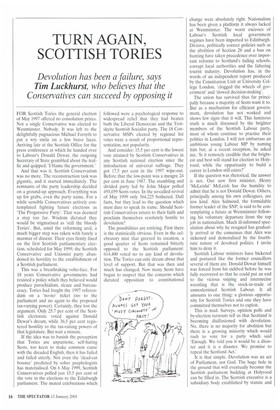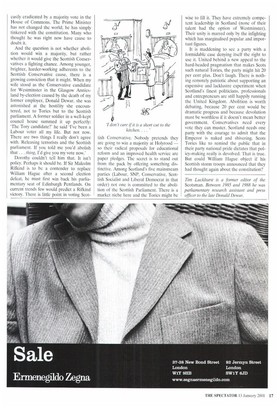TURN AGAIN, SCOTTISH TORIES
Devolution has been a failure, says
Tim Luckhurst, who believes that the
Conseivatives can succeed by opposing it
FOR Scottish Tories the general election of May 1997 offered no consolation prizes. Not a single Conservative was elected to Westminster. Nobody. It was left to the delightfully pugnacious Michael Forsyth to put a wry smile on a few brave faces. Arriving late at the Scottish Office for the press conference at which he handed over to Labour's Donald Dewar, the outgoing Secretary of State grumbled about the traffic and quipped, 'I blame the government.'
And that was it. Scottish Conservatism was no more. The reconstruction task was gigantic, and it started immediately. The remnants of the party leadership decided on a ground-up approach. Everything was up for grabs, even the party name. For a while sensible Conservatives actively contemplated fighting future elections as The Progressive Party'. That was deemed a step too far. Wisdom dictated they would be stigmatised as 'still the bloody Tories'. But, amid the reforming zeal, a much bigger step was taken with barely a murmur of dissent. Their eyes firmly fixed on the first Scottish parliamentary election, scheduled for May 1999, the Scottish Conservative and Unionist party abandoned its hostility to the establishment of a Scottish parliament.
This was a breathtaking volte-face. For 18 years Conservative governments had resisted a policy which they believed would produce parochialism, sleaze and bureaucracy. Tories had fought the 1997 referendum on a 'no-no' ticket (no to the parliament and no again to the proposed tax-varying power). Certainly, they lost the argument. Only 25.7 per cent of the Scottish electorate voted against Donald Dewar's dream, while 36.5 per cent registered hostility to the tax-raising powers of that legislature. But wait a minute.
If the idea was to banish the perception that Tories are unpatriotic, self-hating Scots, too keen to make common cause with the dreaded English, then it has failed and failed utterly. Not even the 'dead-cat bounce' predicted by sober psephologists has materialised. On 6 May 1999: Scottish Conservatives polled just 15.5 per cent of the vote in the elections to the Edinburgh parliament. The muted celebrations which
followed were a psychological response to widespread relief that they had beaten both the Liberal Democrats and the Trotskyite Scottish Socialist party. The 18 Conservative MSPs elected by regional list votes were a result of proportional representation, not popularity.
And consider: 15.5 per cent is the lowest vote attained by Scottish Conservatives in any Scottish national election since the introduction of universal suffrage. They got 17.5 per cent in the 1997 wipe-out. Before that the low-point was a meagre 24 per cent in June 1987. The stumbling and divided party led by John Major polled 493,059 Scots votes. In the so-called revival of May 1999 only 364,225 bothered. Dull facts, but they lead to the question which must dare to speak its name. Should Scottish Conservatives return to their faith and proclaim themselves resolutely hostile to devolution?
The possibilities are enticing. First there is the statistically obvious. Even in the celebratory mist that greeted its creation, a good quarter of Scots remained bitterly opposed to the Scottish parliament: 614,400 voted no to any kind of devolution. The Tories can only dream about that level of support. But that was then and much has changed. Now many Scats have begun to suspect that the concerns which dictated opposition to constitutional change were absolutely right. Nationalism has been given a platform it always lacked at Westminster. The worst excesses of Labour's Scottish local government regimes have been imported to Edinburgh.
Divisive, politically correct policies such as the abolition of Section 28 and a ban on hunting have taken precedence over impor tant reforms to Scotland's failing schools, corrupt local authorities and the faltering tourist industry. Devolution has, in the words of an independent report produced by the Constitution Unit at University College London, 'clogged the wheels of government' and 'slowed decision-making'.
The union has survived thus far principally because a majority of Scots want it to.
But as a mechanism for efficient govern ment, devolution has not worked and shows few signs that it will. This luminous truth is much discussed by the brighter members of the Scottish Labour party, most of whom continue to practise their politics in London. I will not embarrass an ambitious young Labour MP by naming him but, at a recent reception, he asked me, Is it remotely credible that the brightest and best will stand for election to Holyrood, while the opportunity to build a career in London still exists?'
If the question was rhetorical, the answer is not. Our new first minister, Henry `McLeishe' McLeish has the humility to admit that he is not Donald Dewar. Others, principally among his own colleagues, are less kind. Alex Salmond, the formidable former leader of the SNP, is said to be contemplating a future at Westminster follow ing his voluntary departure from the top job in nationalism. Much ill-informed speculation about why he resigned has gradual ly arrived at the consensus that Alex was sickened and demoralised by the fourthrate nature of devolved politics. I invite him to deny it.
Scottish Labour ministers have bickered and postured like the former councillors several of them are. Donald Dewar himself was forced from his sickbed before he was fully recovered so that he could put an end to the vicious sniping and internecine wrestling that is the stock-in-trade of unmodernised Scottish Labour. It all amounts to one thing: a glorious opportunity for Scottish Tories and one they have committed themselves not to exploit.
This is mad. Surveys, opinion polls and by-election turnouts tell us that Scotland is becoming disillusioned with devolution.
No, there is no majority for abolition but there is a growing minority which would rush to vote for a party which said 'Enough. We told you it would be a disaster and it is a disaster. We promise to repeal the Scotland Act.'
It is that simple. Devolution was an act of Parliament, not God. The huge hole in the ground that will eventually become the Scottish parliament building at Holyrood can be filled in. The Scottish executive is a subsidiary body established by statute and easily eradicated by a majority vote in the House of Commons. The Prime Minister has not changed the world; he has simply tinkered with the constitution. Many who thought he was right now have cause to doubt it.
And the question is not whether abolition would win a majority, but rather whether it would give the Scottish Conservatives a fighting chance. Among younger, brighter, harder-working adherents to the Scottish Conservative cause, there is a growing conviction that it might. When my wife stood as the Conservative candidate for Westminster in the Glasgow Anniesland by-election caused by the death of my former employer, Donald Dewar, she was astonished at the hostility she encountered, not to Tories but to the Scottish parliament. A former soldier in a well-kept council house summed it up perfectly: 'The Tory candidate?' he said 'I've been a Labour voter all my life. But not now. There are two things I really don't agree with. Releasing terrorists and the Scottish parliament. If you told me you'd abolish that .. thing, I'd give you my vote now.'
Dorothy couldn't tell him that. It isn't policy. Perhaps it should be. If Sir Malcolm Rifkind is to be a contender to replace William Hague after a second election defeat, he must first win back his parliamentary seat of Edinburgh Pentlands. On current trends few would predict a Rifkind victory. There is little point in voting Scot tish Conservative. Nobody pretends they are going to win a majority at Holyrxxxl — so their radical proposals for educational reform and an improved health service arc paper pledges. The secret is to stand out from the pack by offering something distinctive. Among Scotland's five mainstream parties (Labour, SNP, Conservative, Scottish Socialist and Liberal Democrat in that order) not one is committed to the abolition of the Scottish Parliament. There is a market niche here and the Tories might be wise to fill it. They have extremely competent leadership in Scotland (none of their talent had the option of Westminster). Their unity is marred only by the infighting which has marginalised popular and important figures.
It is maddening to see a party with a formidable case denying itself the right to use it. United behind a new appeal to the hard-headed pragmatism that makes Scots such natural Tories, the party might hit 20 per cent plus. Don't laugh. There is nothing remotely patriotic about supporting an expensive and lacklustre experiment when Scotland's finest politicians, professionals and entrepreneurs arc still happily running the United Kingdom. Abolition is worth debating, because 20 per cent would be dramatic progress and because devolution must be worthless if it doesn't mean better government. Conservatives need every vote they can muster. Scotland needs one party with the courage to admit that the Emperor is naked and shivering. Scots Tories like to remind the public that in their party national pride dictates that policy-making really is devolved. That is true. But could William Hague object if his Scottish storm troops announced that they had thought again about the constitution?
Tim Luckhurst is a former editor of the Scotsman. Between 1985 and 1988 he was parliamentary research assistant and press officer to the late Donald Dewar.































































 Previous page
Previous page